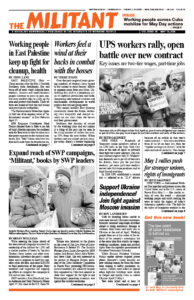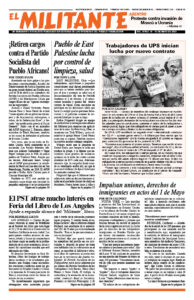COACHELLA, Calif. — “We organized Farmchella to honor and celebrate hardworking farmworkers in Coachella Valley who are overlooked,” Flor Martinez Zaragoza told the Militant April 20.
Martinez Zaragoza is the founder of the Celebration Nation Foundation, which organized this first-time event taking place the same time as the well-known yearly Coachella music festival.
Farmchella organizers contributed music and food, and also provided farmworkers with needed essentials. Local farmers donated pallets of vegetables and fruits for free for farmworkers who attended.
“A lot of people think that the Coachella is just the festival, right? But it’s actually a city, a valley, a home to thousands of farmworkers that endure climate change, the pesticide dusts, and just the living conditions that are below the poverty lines,” she told Channel 3 News.
Carmen Obeso, who has been a farmworker since 2007, first in Ventura and now in Coachella, was helping distribute donated food. “Conditions for farmworkers are not very good,” she said. Farm owners “don’t comply with the laws and really abuse us.”
“There is nonpayment of wages. They don’t pay fairly. There are jobs that pay by the hour, but others by contract,” she said. “We go for months without work but many don’t have the right to unemployment benefits. Many workers are undocumented.
“We have problems with pesticides. When we say we feel bad, they don’t believe us. They say, ‘What you work with isn’t bad, it won’t hurt you,’” Obeso said. “If you take off work, when you return there is retaliation. There are repetitive motion injuries. In Ventura there were a lot of farms with a union, but they shut down or changed their name to avoid the union.”
Nanette Plascencia, who has worked at the Amazon ONT8 warehouse in Moreno Valley for eight years and is part of an organizing effort for a union, told the Militant she came to Farmchella after a friend told her about it.
“I said I want to help out. I have rough conditions at Amazon but not as much as farmworkers for as little as they get paid,” she said. “Workers need to be able to be here for each other. They need to count on each other.”

